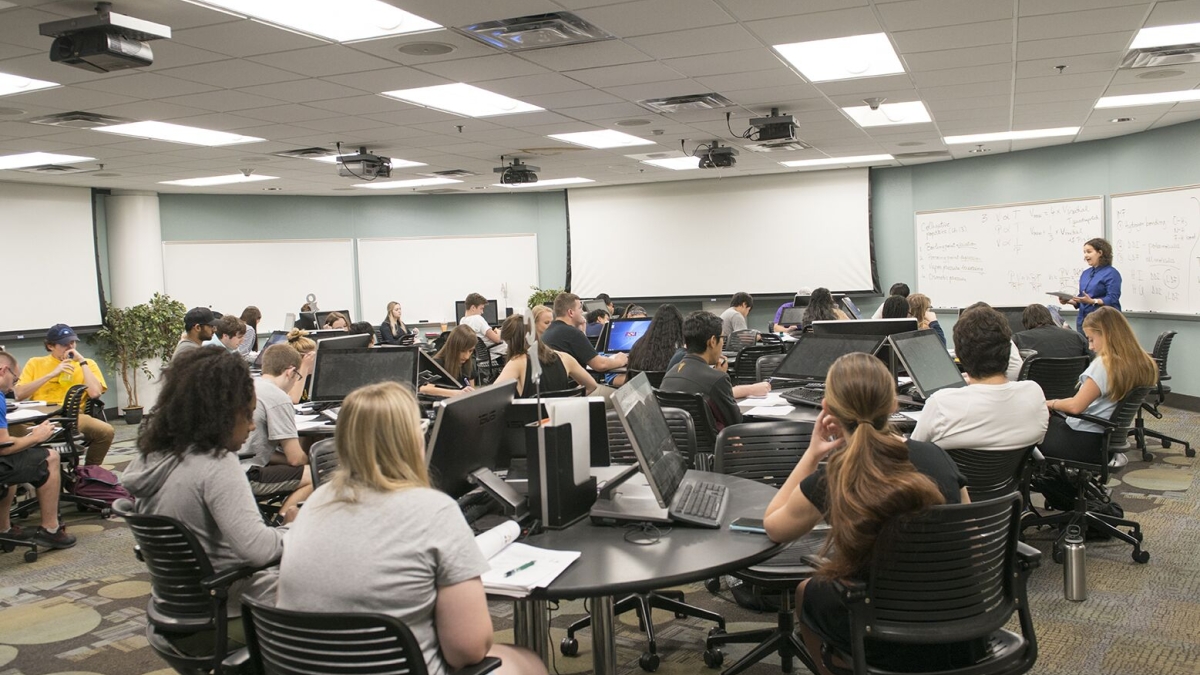ASU students benefit from teaching initiative grant

School of Molecular Sciences Instructor Agota Debreczeni leading a general chemistry discussion session.
This spring, The College of Liberal Arts and Sciences at Arizona State University awarded a faculty fund for a teaching initiative grant to the School of Molecular Sciences to expand their already-successful discussion session program in general chemistry.
“Utilization of additional technology, faculty mentoring and development, and an increased online presence will allow us to significantly improve access to this important student-success initiative. We look forward to sharing our results with the broader ASU community," said Ron Briggs, who co-authored the grant and directs the general chemistry program.
The general chemistry program serves more than 2,500 students from across the university every semester. An important component of this program is the faculty-led discussion sessions where the students engage in deeper discussions on lecture material, laboratory experiments and homework assignments. Approximately 50% of general chemistry students participate in the discussion sessions each semester, with 70% of these attending multiple sessions.
“The sessions have a positive impact,” said School of Molecular Sciences instructor Stacy Sendler, who co-authored the grant. “Students in the discussion sessions are very engaged and feel comfortable asking questions in a smaller group setting. In addition, there is a sense of community among the students who attend as they see other students who also find the material challenging.”
The teaching initiative grant will not only allow the School of Molecular Sciences to increase the number of in-person discussion sessions offered to students, it will provide funding for high-quality, online recordings with closed captioning and annotations to further increase accessibility.
Rebeca Smith, a grant co-author and discussion-session leader said, “The grant will allow recorded discussion sessions to reach more students and we can archive materials, such as worksheet solutions and exam reviews for students to review whenever they need help.”
“We expect to see increased student participation due to expanded availability,” Briggs said, “which should improve the academic performance for students who are currently unable to attend in-person sessions. At the same time, faculty participation in the program will be expanded.”
Discussion sessions are taught by full-time faculty instructors who are involved in all aspects of the course design. Consequently, the instructors know which concepts the students find most challenging and can focus the discussion Sessions on the most important topics. Minimal turnover among the general chemistry teaching faculty allows for continued improvement in discussion session materials and format, as well as the opportunity for professional development for these faculty members.
“Skilled, experienced faculty provide better instruction for our students,” Briggs said. “Ultimately, it is about student success.”
More University news

Pathways to success: Celebrating ASU transfer graduates this fall
At Arizona State University, students from all corners of the country find their pathways to success through innovative…

ASU Online student will launch a career in law enforcement
Editor’s note: This story is part of a series of profiles of notable fall 2024 graduates.Matthew Meisel entered the corporate…

US Air Force veteran graduates in 2 years while working full-time
Editor’s note: This story is part of a series of profiles of notable fall 2024 graduates.Choosing a school that offered online…